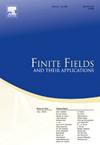关于 2、3、4 度的稳定多项式
IF 1.2
3区 数学
Q1 MATHEMATICS
引用次数: 0
摘要
设 q 为质幂。对于 m=2,3,4,我们通过卡佩利定理构造出 Fq 上 bm-1(x+a)m+c(x+a)+d形式的稳定多项式。此外,当 m=2 且 q≡1(mod4)时,我们改进了由 Goméz-Pérez 和 Nicolás [4] 提出的 Fq 上稳定二次多项式数量的下限。当 m=3 时,我们证明了 Ahmadi 和 Monsef-Shokri 的猜想 [2],即 x3+x2+1 在 F2 上是稳定的。本文章由计算机程序翻译,如有差异,请以英文原文为准。
On the stable polynomials of degrees 2,3,4
Let q be a prime power. For , we construct stable polynomials of the form over by Capelli's lemma. Moreover, when and , we improve a lower bound for the number of stable quadratic polynomials over due to Goméz-Pérez and Nicolás [4]. When , we prove Ahmadi and Monsef-Shokri's conjecture [2] that is stable over .
求助全文
通过发布文献求助,成功后即可免费获取论文全文。
去求助
来源期刊
CiteScore
2.00
自引率
20.00%
发文量
133
审稿时长
6-12 weeks
期刊介绍:
Finite Fields and Their Applications is a peer-reviewed technical journal publishing papers in finite field theory as well as in applications of finite fields. As a result of applications in a wide variety of areas, finite fields are increasingly important in several areas of mathematics, including linear and abstract algebra, number theory and algebraic geometry, as well as in computer science, statistics, information theory, and engineering.
For cohesion, and because so many applications rely on various theoretical properties of finite fields, it is essential that there be a core of high-quality papers on theoretical aspects. In addition, since much of the vitality of the area comes from computational problems, the journal publishes papers on computational aspects of finite fields as well as on algorithms and complexity of finite field-related methods.
The journal also publishes papers in various applications including, but not limited to, algebraic coding theory, cryptology, combinatorial design theory, pseudorandom number generation, and linear recurring sequences. There are other areas of application to be included, but the important point is that finite fields play a nontrivial role in the theory, application, or algorithm.

 求助内容:
求助内容: 应助结果提醒方式:
应助结果提醒方式:


